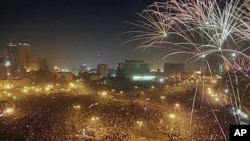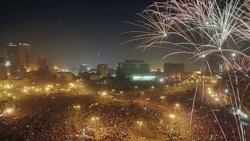The United States seeks to support the people of the Middle East and North Africa as they work to realize their aspirations for greater dignity, justice, and opportunity. So said Tara Sonenshine, Under Secretary for Public Diplomacy and Public Affairs, at the U.S.-Islamic World Forum. She went on to note that the U.S. provides assistance to the democratic transitions underway there and partners with reformers inside and outside government.
With more than 60 percent of the population of the Middle East and North Africa under the age of 30, it is critical that career and educational opportunities keep up with demand.
That includes ensuring that nongovernmental organizations are allowed to operate freely. It means governments that advance and protect freedom of expression, assembly and association for their citizens, with laws that are consistent with their international obligations and commitments. Promoting religious tolerance is essential, as is the protection of all minorities, if everyone is to have a chance to contribute. And outbreaks of sectarian violence must stop.
"The outcomes are clear," said Under Secretary Sonenshine, "when we build inclusive economies, safeguard freedoms, invest in education, and encourage opportunity, people become more healthy, productive, democratic, empowered, and prosperous. They are more likely to become viable economic, trade, social, political, and strategic partners, enhancing security and prosperity for all."
That is why the United States has worked hard with its partners, through such initiatives as the Middle East and North Africa Incentive Fund to help governments build effective institutions that can promote economic growth and provide for its people, especially youth. That is why the U.S. works with such groups as the Overseas Private Investment Corporation, G-8 partners and the United Nations.
The challenge is to bridge the gap between the government and the governed, between traditional diplomacy and public diplomacy. To make policies work for people. We do this, said Ms. Sonenshine, by supporting men and women as they support themselves and build positive societies to pursue higher education, become entrepreneurs, promote religious tolerance, create business deals, improve transparency, forge peace treaties, and support democratic institutions.
With more than 60 percent of the population of the Middle East and North Africa under the age of 30, it is critical that career and educational opportunities keep up with demand.
If this young generation is to live free lives, it needs help now building democratic institutions and brokering peace.
That includes ensuring that nongovernmental organizations are allowed to operate freely. It means governments that advance and protect freedom of expression, assembly and association for their citizens, with laws that are consistent with their international obligations and commitments. Promoting religious tolerance is essential, as is the protection of all minorities, if everyone is to have a chance to contribute. And outbreaks of sectarian violence must stop.
"The outcomes are clear," said Under Secretary Sonenshine, "when we build inclusive economies, safeguard freedoms, invest in education, and encourage opportunity, people become more healthy, productive, democratic, empowered, and prosperous. They are more likely to become viable economic, trade, social, political, and strategic partners, enhancing security and prosperity for all."
That is why the United States has worked hard with its partners, through such initiatives as the Middle East and North Africa Incentive Fund to help governments build effective institutions that can promote economic growth and provide for its people, especially youth. That is why the U.S. works with such groups as the Overseas Private Investment Corporation, G-8 partners and the United Nations.
The challenge is to bridge the gap between the government and the governed, between traditional diplomacy and public diplomacy. To make policies work for people. We do this, said Ms. Sonenshine, by supporting men and women as they support themselves and build positive societies to pursue higher education, become entrepreneurs, promote religious tolerance, create business deals, improve transparency, forge peace treaties, and support democratic institutions.






